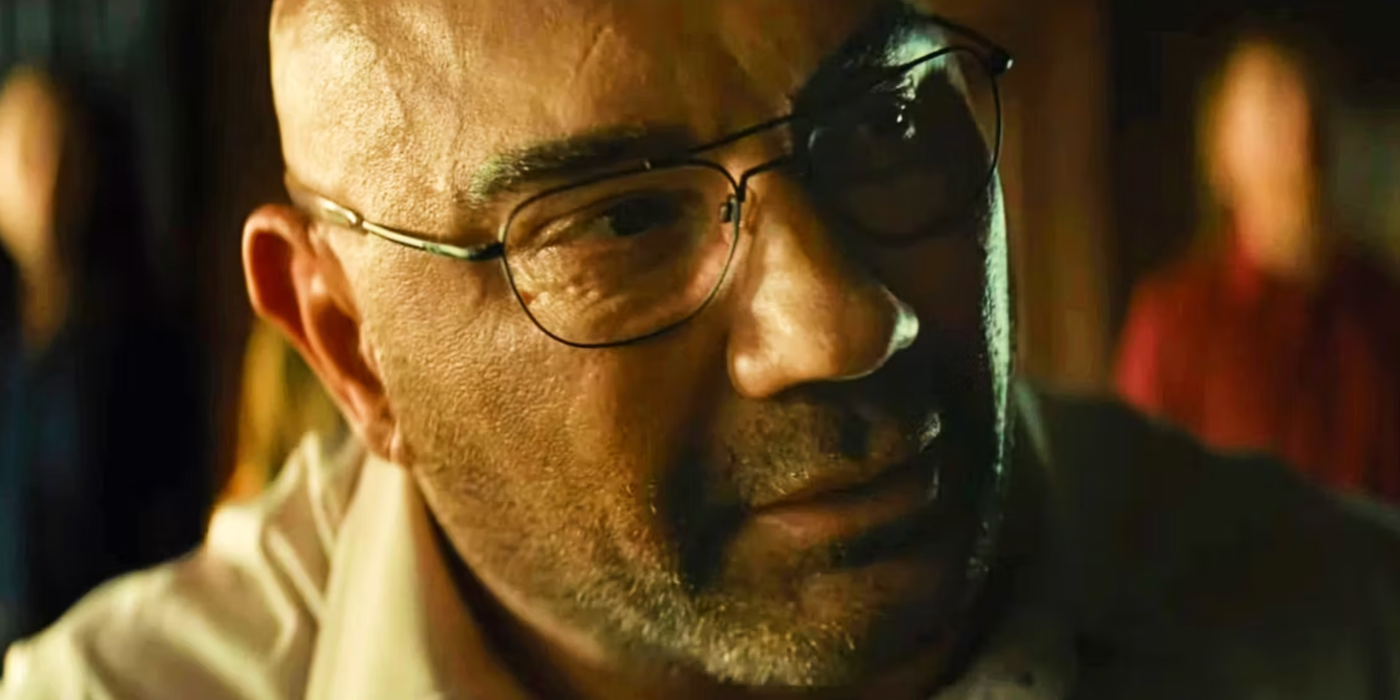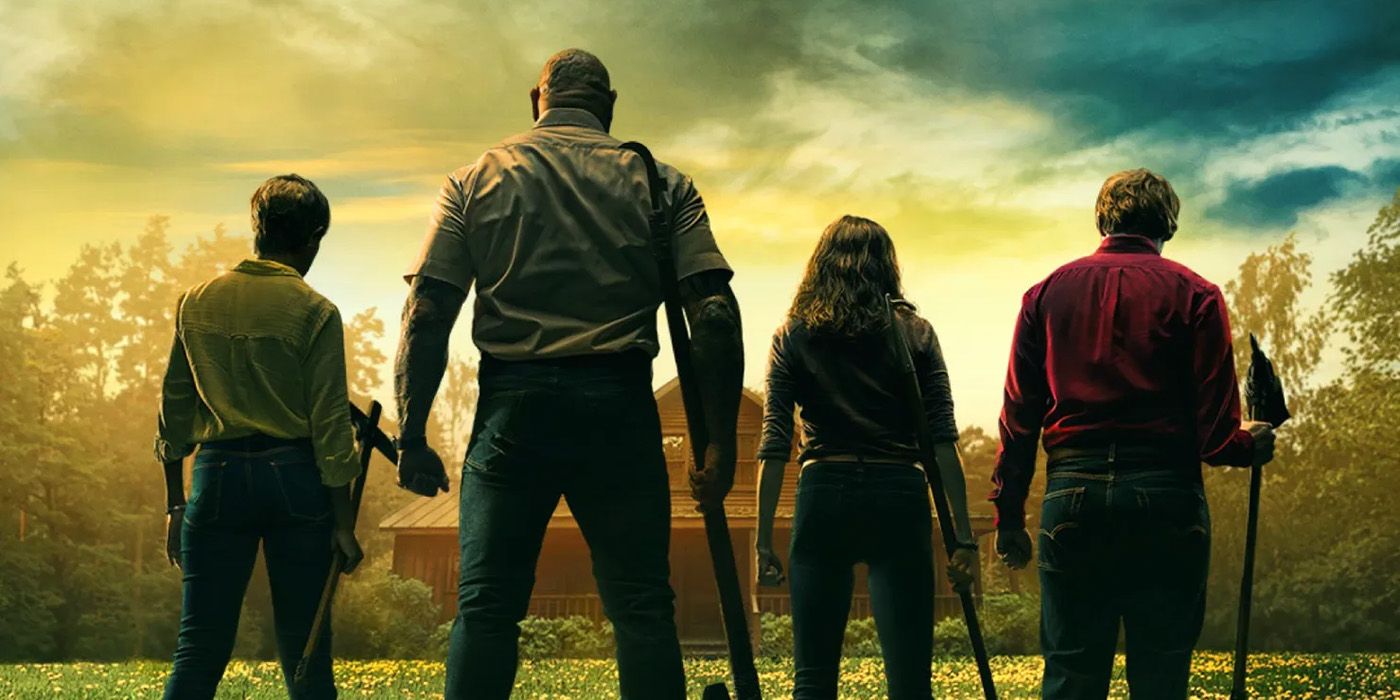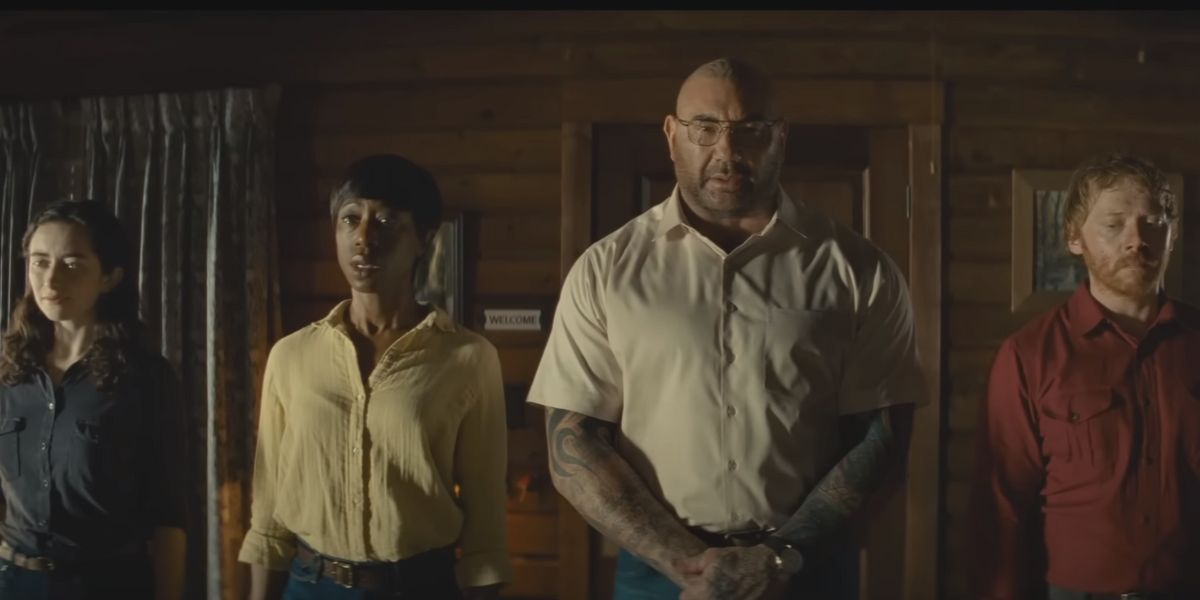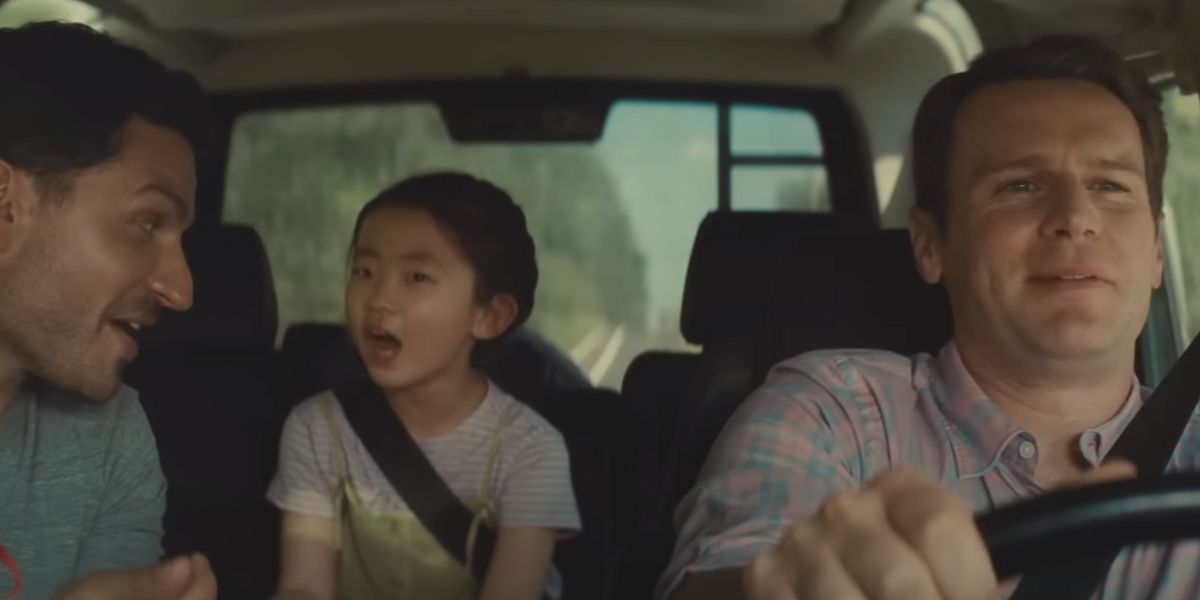At the beginning of Knock at the Cabin, we watch as seven-year-old Wen (Kristen Cui) collects grasshoppers outside a cabin in the middle of the woods. She carefully sneaks up on the bugs as she collects them in her hands, and places them in her jar, while making sure none of the insects inside jump out. After twisting the lid of the jar on tight, she tells the grasshoppers that she isn’t going to hurt them, but she just wants to study them for a while.
On one hand, it's easy to see this moment as M. Night Shyamalan (who directs and also co-wrote the screenplay with Steve Desmond and Michael Sherman, based on Paul G. Tremblay’s book, The Cabin at the End of the World) stating that he is the watcher of this world he is putting before the audience, putting all these characters into a jar and studying what happens when they all get together. But zooming out a bit more, this moment more likely represents Shyamalan’s view of a higher power, as God—however it is defined—can seem like a child playing with his bugs, testing them, and watching their reactions. There’s always the slightest possibility that the person outside the jar could interfere, but they never do, instead watching how the creatures inside react to the situations they’ve been put into.
In a way, Shyamalan almost uses Knock at the Cabin as a way to explore themes he’s played with before with varying degrees of success, like faith (Signs, The Village) and the ignorance of avoiding the truth about the destruction of the world when the evidence is there (The Happening). Yet by restricting the story to this one cabin in the woods, it also plays to Shyamalan’s strengths, considering he’s often at his best when he puts his characters in claustrophobic and limited situations (Signs showed us an alien invasion mostly from the viewpoint of a house in the middle of nowhere, while Shyamalan also came up with the story for Devil, which took place entirely in an elevator). And while Shyamalan can certainly be hit-or-miss, Knock at the Cabin—with its combination of Shyamalan's interests and strengths—ends up being one of the better films in the director’s varied filmography.
As Wen collects her grasshoppers, she meets Leonard (Dave Bautista), who seems nervous, a bit scared, and yet inherently intimidating, considering he's played by Dave Bautista. Leonard tells Wen that he wants to meet her dads, Eric (Jonathan Groff) and Andrew (Ben Aldridge), and discuss something very important with them. Wen runs to her dads, who try to barricade the cabin from Leonard and his associates (Nikkie Amuka-Bird, Abby Quinn, and Rupert Grint) from getting in, but the effort is futile. Once inside, Leonard explains why he and these three other people are here: they have seen a vision of destruction that will lead to the apocalypse, and the only way to stop the end of the world is a willing sacrifice from Eric, Andrew, or Wen.
What makes this scenario even more unnerving is that it’s clear Leonard and his team don’t want to do this to this family, but they are compelled by some unexplainable force to undergo such horrific actions. They don’t want to tear apart this family, and they don’t want to force them to make such an awful choice, yet their belief has made it so they have no other option. If one of the members of this family doesn't die, everything else will.
Shyamalan has always been a master of spatial horror, knowing just how to play with the limitations of a location to maximize the fear. Take, for example, the way Cole (Haley Joel Osment) hid in his red tent before realizing he wasn’t alone inside with The Sixth Sense, or how eery he could make an alien walking by on a home recording feel in Signs. Shyamalan is great when restrictions are put in place, and given the one location and small cast of characters, this restraint makes this feel like one of the tightest Shyamalan films in quite some time.
It’s also been interesting to watch Shyamalan, with this and 2021’s Old, attempt to adapt existing stories and put his spin on the narrative. Knock at the Cabin doesn't have the expected “Shyamalan twist,” and it does change details of the original book, but Knock at the Cabin ends up feeling like a smart combination of the original idea and Shyamalan’s tone—which work together quite well. The only time that Knock at the Cabin struggles with this story is in its approach to queerness, as the film occasionally brings up the idea that these visitors could just be bigots exacting revenge on these two parents, even though that’s more of a rationalization of these actions as opposed to a real possibility.
But this is a concept that works because of how well Shyamalan’s cast sells this idea. Bautista is terrific as Leonard, a schoolteacher who realizes the horrendous impact he’s having on this family, but knows not doing this will only make things worse. Even though Leonard and his group are doing awful things, we manage to have sympathy for them, as their dedication to their faith in their visions makes us believe them. This might be Bautista’s finest role yet, a performance that shows the depth of emotion he can pull off in every scene, a gentle giant that struggles with his choices throughout this story, but knowing that he's committing a necessary evil.
Eric and Andrew are also key in making this story work, as both represent the divergence in beliefs that would make this scenario even more difficult. Jonathan Groff’s Eric quickly starts to open himself up to the possibility that these invaders are telling the truth, as their first refusal to sacrifice a member of their family leads to a massive earthquake and subsequent tsunami to devastate the world. But Ben Aldridge’s Andrew is also set in his belief that this all has to be complete bullshit, that killing someone—especially someone he deeply loves—won’t save the world. Shyamalan uses these two characters as a commentary on our world: some people can see the facts and truth and realize a change needs to happen, while others can see the writing on the wall and make excuses for why they don't need to change.
Knock at the Cabin definitely feels like Shyamalan’s biggest dissection of faith in years, as the sacrifice does in many ways remind of Abraham attempting to sacrifice his son Isaac, and the four intruders can’t help but feel like Biblical messengers, heralding their actions will bring about the end of times. And while this has absolutely been an interest of Shyamalan in the past, Knock at the Cabin manages to get away with it without also feeling extremely preachy about the importance of faith. It's also just as easy to see Knock at the Cabin in this world of COVID as a reminder of just how people can ignore the signs and attempt to live their lives without any interference, happy to rationalize their viewpoint even as the world falls apart around them.
Yet at its very core, Knock at the Cabin works because it reminds of the early days of Shyamalan, when he felt like the next coming of Alfred Hitchcock, and his films would leave the audience talking for days after. While Knock at the Cabin isn’t necessarily up to the standards of Shyamalan in the late 90s-early 2000s, it’s hard to watch Knock at the Cabin and not get a jolt of a reminder of why Shyamalan felt so important in the first place, and how exciting watching one of his films could be.
Rating: B
Knock at the Cabin comes to theaters on February 3rd.




